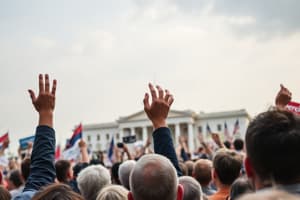Podcast
Questions and Answers
Post-modern meaning of public opinion includes only peer pressure to slow down citizen involvement.
Post-modern meaning of public opinion includes only peer pressure to slow down citizen involvement.
False (B)
Democratic peace theory suggests that democratic nations are more likely to go to war with each other.
Democratic peace theory suggests that democratic nations are more likely to go to war with each other.
False (B)
Elite theory and Marxism both suggest that policymaking is dominated by powerful elites or business interests.
Elite theory and Marxism both suggest that policymaking is dominated by powerful elites or business interests.
True (A)
Flashcards are hidden until you start studying
Study Notes
Theoretical and Empirical Perspectives on Public Opinion and Democracy
- The post-modern meaning of public opinion (PO) has two aspects: peer pressure to slow down citizen involvement and governments' resources to control and manipulate PO.
- Democracies prioritize being responsive to PO over non-democratic governments.
- Theory refers to generalizations that explain, inform research, and predict or influence future events.
- Democratic peace theory suggests that democratic nations are less likely to go to war with each other.
- Democracy can be direct or indirect, with James Madison arguing that pure democracies lead to conflict-ridden states.
- Normative theories range from minimalist, where citizens can replace rulers through elections, to maximalist, where citizens govern themselves.
- Citizens' democratic competence refers to their ability to meet the requirements of democratic models.
- Policymaking is expected to be at least somewhat responsive to PO due to periodic elections and voters choosing leaders who share their values and opinions.
- Policymakers learn about PO through public opinion research and interest groups representing disparate viewpoints.
- Elite theory and Marxism suggest that policymaking is dominated by powerful elites or business interests.
- The elements of democratic competence include good heart, reasoning mind, and balanced judgment, but assessing qualification is subjective.
- Essential conditions for public opinion in democracies include freedom of communication, time for deliberation, and nonpartisan administrative procedures.
Studying That Suits You
Use AI to generate personalized quizzes and flashcards to suit your learning preferences.




